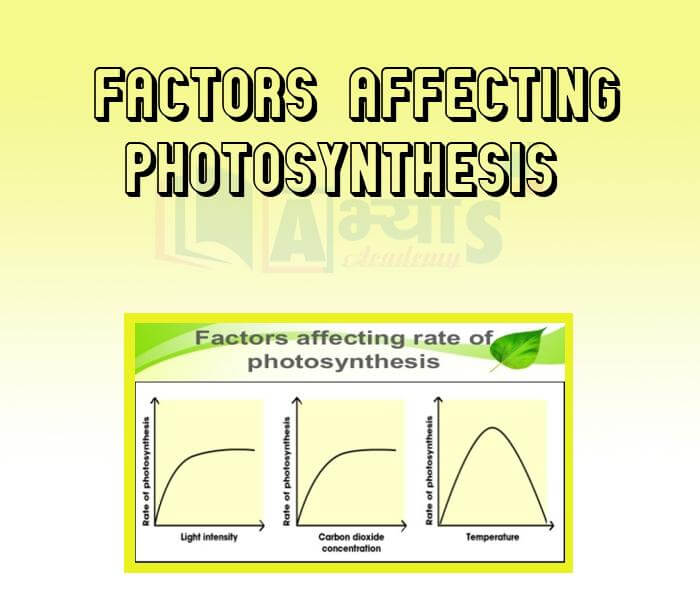Factors Affecting Photosynthesis











Factors Affecting Photosynthesis
Factor Affecting Photosynthesis:
The various factors affecting photosynthesis are light, carbon dioxide, water etc.
Experiment to demonstrate that starch is formed during photosynthesis:
Pluck a healthy green leaf which was in the sunlight. Place it in a beaker containing boiling water for about two minutes. Now transfer the leaf to a beaker containing alcohol. Warm it over a water bath for a few minutes. You will observe that the leaf turns white, indicating that the chlorophyll has been removed. Now wash the leaf carefully in water without damaging it. Place the leaf in a dilute solution of iodine. This will turn the leaf bluish black. The changing of the leaf’s colour to bluish black after it has been treated with iodine solution shows that the leaf contains starch.
Experiment to demonstrate that carbon dioxide is essential for photosynthesis:
Get two healthy potted plants of almost the same size and place them in the dark for 24 hours to de- starch leaves. Now place them on a glass plate. Cover the plants with separate bell jars. Keep some crystals of potassium hydroxide (KOH) in a petri dish and place it under one of the jars. Make the set up airtight by applying Vaseline at the bottom of the bell jars. Keep the plants in sunlight for photosynthesis to take place. After 3 to 4 hours, pluck a leaf from each plant. Boil the leaves in water and subsequently in alcohol, using a water bath, to remove chlorophyll. Now use a few drops of iodine to test to starch in each leaf. Only one leaf turns blue black colour showing the presence of starch. This happens because KOH absorbs the CO2 present inside one bell jar. As a result, the leaves do not get CO2 for photosynthesis. Thus the process is inhibited and starch is not synthesized.
Experiment to show that sunlight is essential for photosynthesis:
Keep a potted plant in the dark for 24 hours. On one of the leaves, stick black paper strip (one below and one above the leaf) with the help of cello tape. Now, place this plant in sunshine for a few hours. Pluck the leaf and remove the black strips. Boil this leaf, first in water and then in alcohol, to remove chlorophyll. After washing the leaf with water, keep it in a petri dish. Add a few drops of iodine solution. The leaf turns blue- black except in the region that had been covered. This region did not receive light and hence no starch was formed. The uncovered region received light and starch was formed due to photosynthesis.
The rate of photosynthesis increases on ________________ the concentration of carbon dioxide in the atmosphere. | |||
| Right Option : C | |||
| View Explanation | |||
Which of the following are correct ? (a) The longer the plant is exposed to light, the longer the process of photosynthesis will continue. (b) The rate of photosynthesis increases on increasing the concentration of Carbon dioxide in the atmosphere. (c) When there is a reduced water intake or availability, the stomata begin to close to avoid loss of any water during transpiration. | |||
| Right Option : D | |||
| View Explanation | |||
________________ is considered as the most important factors affecting photosynthesis ? | |||
| Right Option : D | |||
| View Explanation | |||
Students / Parents Reviews [10]
My experience with Abhyas is very good. I have learnt many things here like vedic maths and reasoning also. Teachers here first take our doubts and then there are assignments to verify our weak points.

Shivam Rana
7thIt was a good experience with Abhyas Academy. I even faced problems in starting but slowly and steadily overcomed. Especially reasoning classes helped me a lot.

Cheshta
10thA marvelous experience with Abhyas. I am glad to share that my ward has achieved more than enough at the Ambala ABHYAS centre. Years have passed on and more and more he has gained. May the centre flourish and develop day by day by the grace of God.

Archit Segal
7thIt was good as the experience because as we had come here we had been improved in a such envirnment created here.Extra is taught which is beneficial for future.

Eshan Arora
8thMy experience with Abhyas academy is very good. I did not think that my every subject coming here will be so strong. The main thing is that the online tests had made me learn here more things.

Hiya Gupta
8thBeing a parent, I saw my daughter improvement in her studies by seeing a good result in all day to day compititive exam TMO, NSO, IEO etc and as well as studies. I have got a fruitful result from my daughter.

Prisha Gupta
8thIt has a great methodology. Students here can get analysis to their test quickly.We can learn easily through PPTs and the testing methods are good. We know that where we have to practice

Barkha Arora
10thAbout Abhyas metholodology the teachers are very nice and hardworking toward students.The Centre Head Mrs Anu Sethi is also a brilliant teacher.Abhyas has taught me how to overcome problems and has always taken my doubts and suppoeted me.

Shreya Shrivastava
8thI have spent a wonderful time in Abhyas academy. It has made my reasoning more apt, English more stronger and Maths an interesting subject for me. It has given me a habbit of self studying

Yatharthi Sharma
10thAbhyas is a complete education Institute. Here extreme care is taken by teacher with the help of regular exam. Extra classes also conducted by the institute, if the student is weak.
